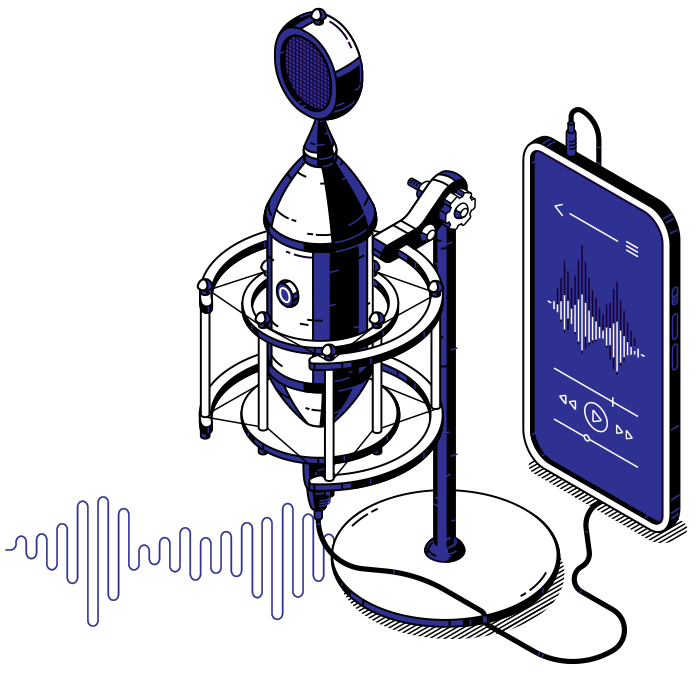Are you thinking about getting into the world of podcasting? Or, you already have your own podcast but are struggling to get the listener count that you had hoped for? Podcasting SEO may be the key to success you’ll want to learn about.
SEO stands for search engine optimization. It is what helps potential viewers or listeners find your podcast when they search for it.
Whether your potential listeners are using a dedicated media player or just searching for a podcast on Google, search engines will display the best results for their search largely based on keywords.
Keywords are certain words that search engines look for to display the most relevant results to the person performing the search.
For example, to find this article you may have searched something like “podcasting SEO” or “how to use keywords to improve my podcast ranking” or something of the like. The most important words, the keywords, from those searches appear through this article. Words like “podcasting”, “SEO”, “keywords”, etc. were found in this article and were relevant to your search — that’s a big part of what led you here!
In this article, you’ll learn everything you need to know about using keywords. You’ll discover how to make your podcasts more visible to the world and gain those listeners that you deserve.
Search Engine Optimization and Podcasts – An Overview
Google’s Support for Podcasts
In early 2019, Google took a look at the growing popularity of podcasts across the globe. They decided they wanted to get in on the action even more so than usual. Therefore, they started allowing podcasts to show up directly in the search results when someone searches for a podcast.
This was a huge step for podcasts. Having the search result support of the world’s biggest search engine behind them strengthens the argument that podcasts are here to stay. As one of the biggest corporations in the world, who’s to argue with Google about what’s going to last and what is a fleeting source of content?
Differences Between Regular Search Engines and Media Players
The ways that media players like Spotify and iTunes use SEO are a bit different than how your typical search engines like Google or Bing work with regards to podcasts.
Regular search engines are far more complex in everything they look into when someone searches with their platform. The following are some of the most important factors when it comes to SEO with search engines like Google or Bing:
- Having a secure webpage that can be accessed
- Keywords, keywords, keywords.
- Links to and from the site
- Social signals
- Page speed
This is just a very basic look at all the different things that regular search engines look at when preparing to display results.
There are many more technical aspects behind it. This differs from how dedicated media players like iTunes search for podcasts, as they mainly focus on:
- Keywords!
- User reactions
As you can see from the much shorter list above, these podcast search engines are more basic than Google. But one thing remains consistently important no matter where you search for a podcast — Keywords!
The Backbone of SEO: Keywords
Using great keywords is the single most important thing that you can do to generate more traffic to your website.
Studies in the past have shown that 95% of people don’t bother looking past the first page of search results. If you are unable to get your podcast or webpage to appear on the first page, you will struggle to get much traffic.
That’s why it is so important to use keywords to your advantage. This will generate organic traffic to your podcast through higher ranking search engine results.
The more specific and concise keywords that you use in your podcast titles, episode names, and descriptions, the better it will be in terms of SEO.
Coming up with the best keywords is not the easiest thing in the world. But, you really don’t want to overthink it either. The best thing to do when you’re trying to come up with relevant keywords is to take a minute and just think. Imagine that you are the person on the other side. Think about what you would search for in order to find your podcast.
Would you type in some super-specific string of keywords that lead directly to your podcast? Probably not. It’s more likely that you would just type a few simple words into the search bar that briefly describe what you’re hoping to find and then you’d click on the first couple of results that you get. Those are the exact keywords that you should be using for the best SEO results.

Using Keywords to Optimize Your Podcast
There are three main places that you’ll want to make sure you employ the use of good keywords when it comes to podcasting. These are your title, episode names, and episode descriptions.
You don’t want to have vague descriptions of your episodes or hope that the person searching is going to type a paragraph into the search bar. You want to utilize the same keywords that you think people will be using to find your podcast in the first place.
The key is to do this naturally without forcing words in unnecessary places solely for the purpose of having them.
Keyword Usage in Your Podcast Title
The title of your podcast is what people will come to know you by in the industry, and what people that like your content will search for to find you.
The importance of choosing a good title is more important when it comes to new listener acquisition rather than your regular listeners.
While it is certainly an option to leave your title somewhat vague as many in the Industry do, cue “The Joe Rogan Experience”, that just means you’ll have to knock keyword usage in your episode titles and descriptions out of the park.
Keep in mind that celebrities that have their own podcasts — Mr. Rogan, for example — have a much easier time getting listeners and viewers to tune in regardless of keyword usage. Their fame and clout alone get people to listen. Unfortunately, you may not have that same ability when making your own podcast.
With that in mind, you want to be sure to choose a podcast title that is relevant to the main topics of your show.
For example, if you have a podcast about personal finance and money management, you don’t just want to title it something completely vague like “The Saturday Morning Talkshow”. That does absolutely nothing for you when it comes to attracting new listeners. A name like that also does zero in terms of SEO, and you’ll likely be trapped somewhere on the 50th page or further of someone’s search results.
Choose a title that gives listeners an idea of what you may talk about on a general basis. If you’re a sports show, have something relevant to sports in your title; if you talk about movies, include a word or two about the film industry.
While coming up with a creative title for your podcast is stressful enough as it is, you also want to throw some nice keywords in there as well to help with the search results.
Using Better Keywords in Your Episode Names
Similarly to your podcast title, the usage of well-thought-out keywords in the titles of each episode you put out is equally important, if not more. This is because the title of the podcast is what it is. It can help you gain new listeners, sure. But the vast majority of your listeners will find your show based on one specific episode coming up based on what they searched for.
Think of it like basically anything you search for on Google. When you type something in and hit search, a specific webpage or article will come up and that’s what you’ll click on. You don’t just click on the website’s home page and then navigate to the specific article that you want. Think of those articles or webpages as your episodes – that’s what people will more than likely find when they are searching for something.
When you are thinking of names for your newest episode, you’ll want to be specific about what it’s about without being so specific that nobody is going to search for those same words.
The key is to come up with a name that will consist of the most relevant keywords so that various combinations of people’s searches will bring up your podcast.
An easy way to find the best keywords for each episode is to use the various keyword search tools available online.
These tools allow you to type in whatever your episode is about content-wise, and then they will suggest all sorts of keywords for you.
Many of them will even include a convenient SEO score of some sort to let you know how that keyword performs with SEO in mind. Use these free tools to your advantage to make the best possible episode titles that you can.
One additional bonus to episode names, especially as we move to a more AI-assisted world, is to try creating a title that incorporates the best keywords into the form of a question.
This is because many people simply type actual questions into the search bar when they’re looking for something. With voice assistants gaining popularity, that’s exactly how your episodes might be found.
The Last Piece of the Puzzle: Episode Descriptions
The descriptions of your episodes are where you can be a bit wordier with what you’re trying to say. Whereas the title of your podcast and the title of each episode need to be to the point and incorporate keywords in short order, the descriptions can have some length to them. Don’t think that just because they can be longer you should forget the keywords; you still want to add those keywords in while writing your descriptions.
Don’t go overboard and try to force a particular keyword in every other word or anything. Just add in the best keywords wherever they fit in the description naturally.
This will allow search engines to find the keywords in your descriptions. It will also allow for much smoother flow when it comes to your audience reading through it.
Oftentimes, someone will search for something and find your podcast. Great, you’ve done the hardest part of getting traffic to your show! Rather than invest a bunch of their time just listening to it blindly, the listener will often read the description to make sure it’s something they want to listen to. This is why descriptions are so important.
Blurbs of the description will also often pop up when someone searches for and finds your podcast. Within these small blurbs, your potential listener will see their search times bolded for them (your keywords!) and be able to get a glance at what they’re in for without even having to click on your podcast; so don’t slack when it comes to keyword-rich descriptions that will help draw in your audience!
Podcasts and SEO: Keywords are the Most Important Part of the Process
There’s no doubt about it, keywords are without a doubt the most important part of the SEO process. If you don’t use keywords to your advantage, you won’t only have trouble breaking into the top page of search results, it will be almost impossible to do so.
Be sure to choose your podcast title, episode names, and descriptions wisely to incorporate keywords that will lead the audience right to your podcast. You have all sorts of competition out there in the podcast industry, with the medium becoming more and more popular year after year.
When it’s saturated with content, you need to do something to make your podcast stick out so that you can hit that coveted first page — work on your keywords!






